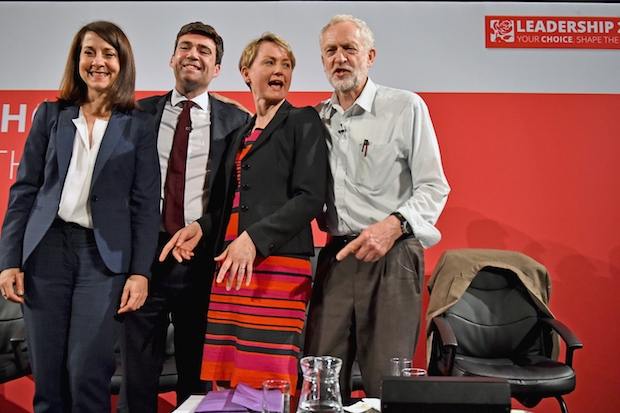Even though Jeremy Corbyn has the Big Mo in this Labour leadership campaign, it is fair to say that Yvette Cooper has had a pretty good few weeks too. The Shadow Home Secretary managed to produce all her passion for her speech today in which she finally rounded on Corbyn, as well as rightly attacking the idea that only those at the hard ends of the political spectrum are the ones with principles. This evening she has bagged the endorsement of the Guardian.
Andy Burnham, meanwhile, has not been enjoying the campaign since his bungled handling of the welfare bill. It was striking this afternoon to hear callers on his World at One interview asking him why he wasn’t producing a credible alternative to ‘Tory-lite’, when for years he had been pitching himself as the left-wing candidate in this contest. Corbyn’s rise has left Burnham looking bewildered. Today he also said he didn’t think it was right to attack Corbyn, arguing that ‘the attacks we’ve seen on Jeremy I think misread the mood of the party because what people are saying is they’re crying out for something different, they are fed up with the way politics has been, particularly the way Labour has been conducting politics in recent times’.
Burnham is right that people are crying out for something different, but what he doesn’t realise, or at least doesn’t want to admit to himself, is that they’re crying out for something different to him and Yvette Cooper. Both represent the SpAdocracy that rules in Westminster – not just in Labour – and no matter how northern Burnham sounds, or how often he talks about his struggle to find work after university (Mr Steerpike has cast a critical eye over this), the fact is that both he and Cooper have been ‘conducting politics in recent times’ in the way that those flocking to Corbyn find so off-putting.
When I interviewed Jeremy Corbyn a few years ago (about being the most rebellious MP who had no ambitions for joining the frontbench, as it happens), I was charmed by how normal he seemed when we spoke. He seemed to genuinely like his constituency: in fact, I recall that he was wearing a rather bright green jumper with the logo of a community centre in Islington on it. He also had the ability to seem as though he was genuinely enjoying a conversation, rather than evaluating what he could get out of it, or thinking three steps ahead so he could ensure his quotes were perfect.
Now, these are all the sorts of skills it is easy to develop on the backbench, where your eccentricities are indulged and your remarks rarely taken as seriously as those of a shadow minister. But they make someone appealingly abnormal in Westminster. And when normal for Westminster is now considered boring and even off-putting, Corbyn’s years of relative obscurity are all of a sudden proved to be rather useful as they have stopped him sounding like a member of the SpAdocracy.
This is why all the other candidates – Cooper, Burnham and Kendall – have found it so difficult to respond to the veteran socialist in an effective manner: they’re all used to conducting contests on the terms of the SpAdocracy, not of rallies where people shout or even in a way that sounds vaguely normal to people who are not well versed in the language and rituals of those who have worked as advisers before representing a constituency themselves. Time was when experience behind the wheel as a special adviser helped someone rise up the greasy pole in a political party. Now it seems to be a serious disadvantage.







Comments